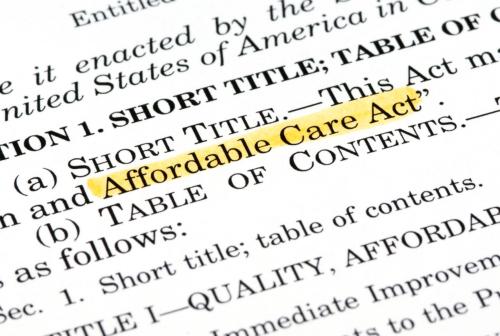Henry Aaron, Stuart Butler, Alan Weil, and Judy Feder join moderator Larry Levitt of kaisernetwork.org in an Ask the Experts webcast for a discussion of the role of states in a national health reform effort.
LARRY LEVITT: This is Larry Levitt, from Kaisernetwork.org. Welcome to Ask the Experts, our regular interactive web show that provides in-depth discussion of current health policy issues.
States have been very much in the news this week as the nation’s governors met with President-Elect Barack Obama in Philadelphia. Among other things on the agenda, an increase in federal matching payments for the Medicaid program. Meanwhile, there’s growing interest in a possible overhaul of the nation’s healthcare system.
Yet, while states have made a responsibility today for providing coverage to low-income Americans, there’s been remarkably little discussion of what role they might play in a new national reform effort.
Should states serve as laboratories of ideas with substantial flexibility to structure reform approaches or should a nation-wide structure be created to govern how people get coverage no matter where they live? And what level of discretion would states have in such a system?
Today we’re joined by an esteemed panel of experts to discuss these and other issues. Stuart Butler is Vice President for Domestic and Economic policy studies at the Heritage Foundation.
Henry Aaron is at the Brookings Institution, where he’s a Senior Fellow in Economic Studies. Alan Weil is Executive Director of the National Academy for State Health Policy and Judy Feder is a professor at Georgetown University and a former health official in the Clinton Administration.
As always, you can submit questions at any time during the show by e-mailing them to [email protected]. Thanks to all of you for joining us and Stuart, let’s start with you.
You’ve proposed, along with Henry, an idea that states would take the lead on healthcare reform. Describe how that would work. What would you do?
STUART BUTLER: Well, it may not be exactly take the lead. It’s more that respond, in a sense, to a challenge at the national level to say. We’re trying to reduce on insurance. We’re trying to reach certain objectives. Let the states come forward with proposals, radical proposals; different ideas about how to achieve those national goals so that you could have one state trying one way, one state trying another. By doing that, you learn what works, what doesn’t work.
You also recognize that variety is very important in the United States in terms of what might work better in one place than another. You hold states to account, to actually accomplish this and you allow them to propose significant changes in existing federal programs to allow them to do that.
You could have Medicare for all in one state. You could have something based on health savings accounts, say, in another state; have the kinds of changes of the law that are not permitted under the current arrangement.
LARRY LEVITT: And you talk about states experimenting with a wide variety of approaches and changing existing federal laws. Would anything be on the table here, Medicare, ERISA?
STUART BUTLER: Well, I think those who are looking to do this on the Hill would say there’d be certain limits in order to have some practicality to it. There are certain things it’s probably wiser not to touch, first of all, but the idea is to say what is the best system that actually works? So, I think proposing significant change is exactly what you want states to do.
The bottom line is can we actually achieve the objectives in a more effective way by re-doing, re-structuring what we currently do. Try things that are different. We think that you’re more likely to see that happening, new ideas be tried, if you allow individual states the option to do that rather than trying to do everything nationally in one fell swoop.
I think politically it’d be very difficult to achieve that with the kind of degree of innovation that I think we really need. But, by keeping national objective, national goals in mind, you’re not just letting 50 states go in 50 different directions with totally different goals.
LARRY LEVITT: Henry, as Stuart’s co-author on this, Stuart talked about these national objectives. What would states have to do in order to qualify for this approach?
HENRY AARON: I think the first requirement is there would have, as a practical matter, for the reasons Stuart suggested, there’d have to be a do no harm proviso that would apply to both Medicare and Medicaid enrollees. That doesn’t mean the benefit structures would necessarily have to be rigid and unchanging, but it means that those who are provided benefits under these programs would have to end up no worse off and possibly, better off than they are today.
But I think there’s a fundamental point here. One way or another, the states are going to be involved. Until the economic collapse, this is a paradox, I believe, I would have suggested that the odds of national reform were close to nil. Paradoxically, the prospects for national action may have increased because of the crisis. Because of the fact that a limit in normal circumstances on healthcare reform was that you really couldn’t spend a great deal more than the base system.
With large amounts of fiscal stimulus and financial support being distributed by the hundreds of billions of dollars to various organizations at the present time, that constraint on healthcare is weakened. But, even if there’s a national bill, the starting point for states, where they’re beginning, what they’re doing now, are so different. And their needs and preferences are so varied that I think there is inevitably, even in a national plan, going to be a very substantial amount of variation across the states.
And given history, one can’t dismiss the possibility that the national effort might not wholly succeed and if that should be the result, then the ball is squarely in the court of the states. They would be the vehicles through which systematic reform would have to take place.



Commentary
Ask the Experts: The Role of States in a National Health Reform Effort
December 4, 2008